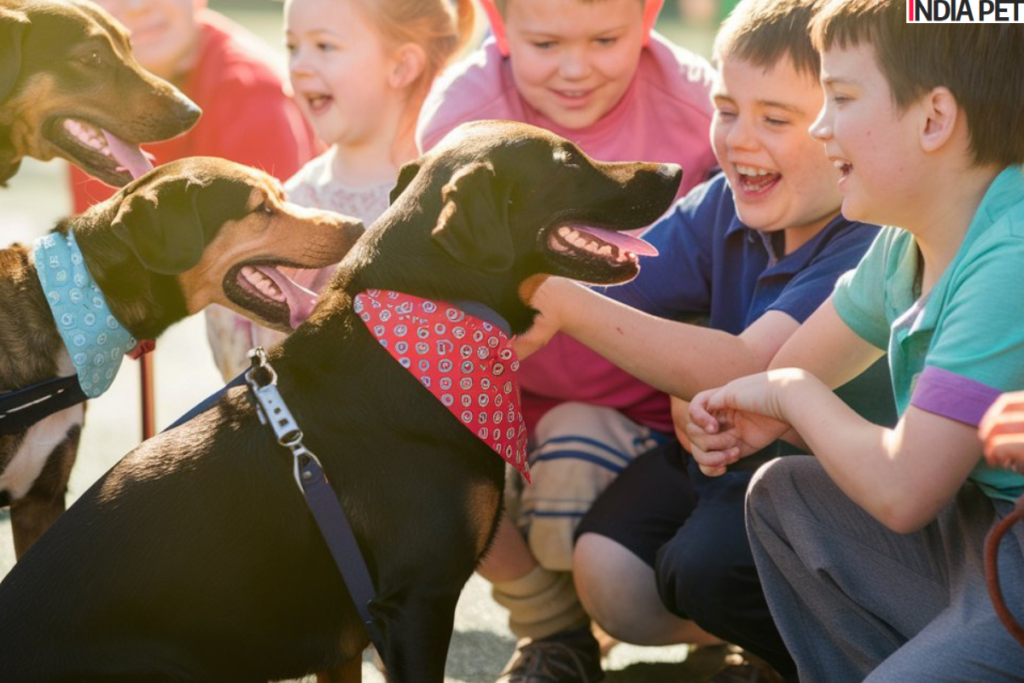Introduction
How Can Dogs Help Mentally Challenged Children? – Dogs have long been recognized as loyal companions, but their role extends beyond simple friendship. For mentally challenged children, dogs can be a source of profound emotional, social, and cognitive benefits. These children often face unique challenges that can make everyday activities and interactions more difficult. However, the presence of a dog can offer unparalleled support and assistance. From reducing anxiety and improving mood to enhancing social skills and providing a sense of routine, dogs can make a significant difference in the lives of mentally challenged children. How Can Dogs Help Mentally Challenged Children? This blog will explore how dogs can help these children, providing a detailed look at their multifaceted benefits.
________________________________________________________________________________
How Can Dogs Help Mentally Challenged Children?
Emotional Support and Companionship
- Reduction of Anxiety and Stress: The presence of a dog can significantly reduce anxiety and stress levels in mentally challenged children. Petting a dog can trigger the release of oxytocin, promoting relaxation and bonding.
- Consistent Companionship: Dogs offer unwavering companionship, helping children feel less alone and more connected to the world around them.
- Improved Mood: Interacting with dogs can boost serotonin and dopamine levels in the brain, improving mood and emotional well-being.

Enhancing Social Skills
How can dogs help mentally challenged children enhance their social skills? By providing a bridge to more positive interactions with others. Dogs can facilitate social engagement in several ways:
- Ice Breakers: Dogs can act as natural icebreakers, making it easier for children to initiate conversations and interact with peers and adults.
- Learning Responsibility: Caring for a dog requires routine and responsibility, which can teach mentally challenged children vital social and life skills.
- Promoting Empathy: Caring for a dog can help children develop empathy and understanding as they learn to recognize and respond to the needs and feelings of their furry friends.
Cognitive and Educational Benefits
Dogs can also contribute to mentally challenged children’s cognitive and educational development. Their presence can make learning more engaging and accessible.
- Enhanced Focus and Attention: Working with dogs can improve a child’s ability to concentrate and stay focused on tasks, which is particularly beneficial for children with attention deficits.
- Motivation to Learn: Dogs can motivate children to engage more enthusiastically in educational activities and therapy sessions.
- Interactive Learning: Incorporating dogs into educational programs can create a more dynamic and interactive learning environment, making it easier for children to grasp new concepts.
Also read : 10 Dog Breeds With Long Tails
Physical Health Benefits
How can dogs help mentally challenged children in terms of physical health? Their active and playful nature can encourage children to be more physically active, which has numerous health benefits.
- Increased Physical Activity: Playing with and caring for a dog can encourage children to engage in regular physical activities, improving their fitness and health.
- Improved Motor Skills: Walking, grooming, and playing with a dog can enhance children’s fine and gross motor skills.
- Health Monitoring: Service dogs can be trained to monitor certain health conditions, alerting caregivers to potential issues such as seizures or drops in blood sugar levels.

Building Routine and Structure
Dogs thrive on routine, and their need for regular feeding, walking, and grooming can help mentally challenged children establish a structured daily routine.
- Consistency: Having a dog provides a consistent daily schedule, which can benefit children who thrive on routine and predictability.
- Time Management: Caring for a dog teaches children how to manage their time effectively, balancing responsibilities with leisure activities.
- Sense of Purpose: Caring for a dog gives children a sense of purpose and responsibility, boosting their self-esteem and confidence.

Also read : 10 Dog Breeds That Are Good With Other Dogs
Therapeutic Interventions
Therapy dogs are specifically trained to assist mentally challenged children in various therapeutic settings.
- Animal-assisted therapy (AAT) involves guided interactions between the child and a therapy dog to achieve specific therapeutic goals.
- Emotional Regulation: Therapy dogs can help children learn to regulate emotions, providing comfort during stressful situations.
- Behavioral Improvements: Regular interaction with therapy dogs can improve behavior, including reduced aggression and better coping strategies.
Conclusion
How Can Dogs Help Mentally Challenged Children? – In conclusion, dogs can profoundly impact the lives of mentally challenged children. From providing emotional support and companionship to enhancing social skills, cognitive development, and physical health, dogs play a multifaceted role in improving the well-being of these extraordinary individuals. How can dogs help mentally challenged children? The answer lies in their unique ability to connect, comfort, and inspire, making them invaluable companions and therapeutic aids. The consistent presence of a dog can bring about positive changes that extend into various aspects of a child’s life, fostering growth, development, and a higher quality of life.
FAQs
Q1: How can dogs help mentally challenged children improve their social skills?
A1: Dogs act as natural icebreakers, making initiating conversations and interacting with others easier. They also teach responsibility and promote empathy, which are crucial social skills.
Q2: What are the physical health benefits of having a dog for mentally challenged children?
A2: Dogs encourage physical activity, improve motor skills, and even monitor certain health conditions, contributing to the overall physical well-being of mentally challenged children.
Q3: Can dogs enhance cognitive abilities in mentally challenged children?
A3: Dogs can improve focus motivation to learn and create an interactive learning environment, making it easier for children to grasp new concepts and stay engaged in educational activities.
Q4: What role do therapy dogs play in the lives of mentally challenged children?
A4: Therapy dogs assist in emotional regulation, behavioral improvements, and achieving specific therapeutic goals through guided interactions, making them an essential part of therapeutic interventions for mentally challenged children.
Q5: How can dogs help mentally challenged children establish a routine?
A5: Dogs require regular feeding, walking, and grooming, which helps children develop a consistent daily schedule, learn time management, and gain a sense of purpose and responsibility.


